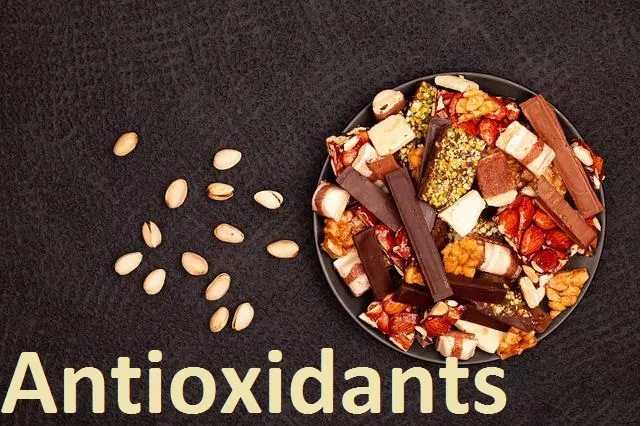Antioxidants, are they important?

Antioxidants are substances that can prevent or slow the damages that free radicals do to the cells in the body. A free radical is any molecule that has an uneven number of electrons, making them highly reactive. The body generates free radicals as cells use oxygen to produce energy in the form of ATP. Free radicals are also formed after exercising or from external sources like pollution, cigarette smoke, radiation and medication. Free radicals can cause large chain chemical reactions in the body because they react so easily with other molecules. These reactions are called oxidation.
The chemical structure, shape and size of free radicals vary, but they all can steal electrons from any nearby molecule, losing the functionality or disrupting the structure of the molecule. When free radicals get electrons from a DNA strand damaging it and change the instructions coded. Free radicals can make circulating LDL cholesterol get trapped in an artery wall, or alter cell membrane and affect the permeability of it. Oxidative stress is a condition that is generated when free radicals are accumulated in the body, which may damage cells and lead to chronic diseases. Antioxidants can give their electrons to free radicals which causes the free radical to stabilize and become less reactive. They are also involved in mechanisms that repair DNA and maintain the health of cells. Balance between free radicals and antioxidants is important to prevent development of chronic and degenerative illness such as cancer, autoimmune disorders, aging, cataract, rheumatoid arthritis, cardiovascular and neurodegenerative diseases. Several lifestyle and environmental factors are known to promote excessive free radical formation and oxidative stress, including, air pollution, cigarette smoke, alcohol consumption, toxins, high blood sugar, high intake of polyunsaturated fatty acids, radiation, excessive sunbathing, bacterial/fungal/ viral infections, excessive intake of iron, magnesium, copper, or zinc,too much or too little oxygen in your body,intense and prolonged exercise,excessive intake of antioxidants, such as vitamins C and E and antioxidant deficiency.
There are hundreds to thousands of different substances that can act as antioxidants. Vitamin C, Vitamin E, Beta carotene, glutathione, selenium, manganese, coenzyme Q10, lipoic acid, flavonoids, phenols, polyphenols, phytoestrogens are among them. The term antioxidant actually means a chemical property of a molecule that is the ability to act as an electron donor.
In the 1990s scientists began to understand the involvement of free radicals to generate artery-clogging atherosclerosis, cancer, vision loss, and a host of other chronic conditions. Some studies showed that people who consumed less fruits and vegetables that contained antioxidants are at greater risk of getting chronic diseases than people who consumed plenty of antioxidants rich foods, however, research has not shown antioxidant supplements to be beneficial in preventing diseases and studies suggest that taking regular, high-dose antioxidant supplements may be harmful. Excessive intake of isolated antioxidants can have toxic effects and may even promote rather than prevent oxidative damage — a phenomenon termed the “antioxidant paradox. It is better to get your daily dose of antioxidants from whole foods.
Antioxidants like vitamin C, vitamin E, carotenoids, selenium, zinc and phenolic compound rich foods are mentioned below.
Vitamin C rich foods includes, guava: oranges, grapefruit, mango,broccoli, brussels sprouts, cantaloupe, cauliflower, grapefruit, leafy greens like turnip, mustard, beet, collards, tangerines, starfruit, Indian gooseberry(amla), governor’s plum (uguressa), honeydew, kale, kiwi, lemon, papaya, pineapple, snow peas, strawberries, sweet potato, tomatoes, and bell peppers (all colors)
Vitamin E rich foods includes fruits like avocado,mango, nuts like almonds, brazil nuts, peanuts, pistachio, seeds like sunflower seed and pumpkin seeds, swiss chard, leafy greens like beet, mustard, turnip, red peppers, spinach (boiled),animal products like abalone, atlantic salmon and cooking oils like almond oil, sunflower oil, safflower oil, grapeseed oil and cottonseed oil.
Carotenoids including beta carotene and lycopene: Apricots, asparagus, beets, broccoli, cantaloupe, carrots, bell peppers, kale, mangoes, turnip and collard greens, oranges, peaches, pink grapefruit, pumpkin,watermelon,spinach,sweet potato,tangerine and tomatoes.
Selenium rich foods include brazil nuts, fish, shellfish, beef, poultry, barley and brown rice.
Zinc rich foods are beef, poultry, oysters, shrimp, sesame seeds, pumpkin seeds, chickpeas,lentils, cashews and fortified cereals
Phenolic compounds like Quercetin,catechins,resveratrol,coumaric acid and anthocyanins rich foods are,
Quercetin - apples, red wine, and onions
Catechins - tea, cocoa and berries
Resveratrol- red and white wine, grapes, peanuts and berries
Coumaric acid - spices and berries
Anthocyanins - blueberries, strawberries
Many substances that happen to be antioxidants also have other important functions like anti-inflammatory activity. Examples are curcuminoids in turmeric and oleocanthal in virgin olive oil have both antioxidant properties and anti-inflammatory properties.
Since antioxidant rich foods should essentially be in a healthy diet, to prevent damages done by free radicals, taking high-dose antioxidant supplements may be harmful. It is beneficial to fulfill your daily antioxidants requirement by eating a diet rich in fruits, vegetables and nuts.
Author - Yashodha Jayalath
MSc in Food Science & Technology, PGIA University of Peradeniya, Sri Lanka.
BSc in Health Promotion, Rajarata University of Sri Lanka.
Pg Dip in Psychological Counselling & Psychotherapy, Institute of Psychological Studies Sri Lanka.
Associate Member of Sri Lanka National Institute of Professional Counsellors, Registration number 2015/1526